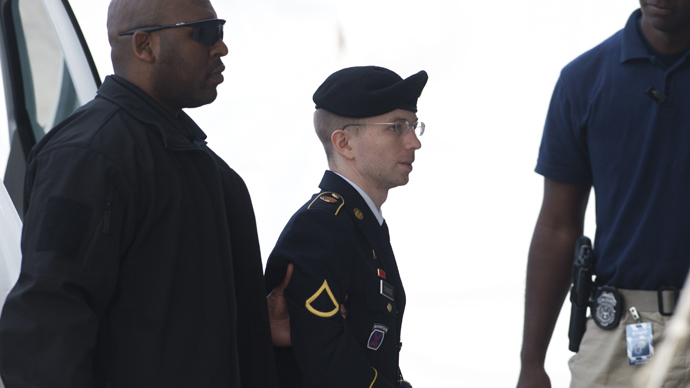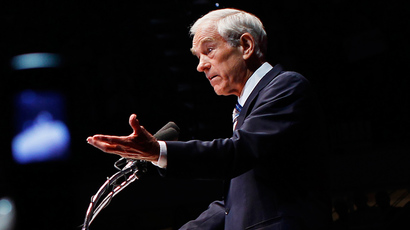'Going to be one hell of a decade’ – Manning to Wikileaks in private online chat in 2010

Buried deep inside a bulging US Army dossier relating to Chelsea (formerly Bradley) Manning’s court martial are 13 pages of online chat between Manning and a Wikileaks contact believed to be Julian Assange.
The communications, first published on the US Army’s FOIA reading
room in late November but since removed, provide some interesting
insight as to what may have motivated former US Army intelligence
analyst Chelsea Manning to release the biggest haul of classified
documents in US history.
Naturally, many of the conversations involve Manning’s release of
top secret US Army documents to WikiLeaks.
On March 6, Assange tells Manning that “full transcript for
video is now complete.” The comment seems to be a reference
to explosive Iraqi War video footage, entitled ‘Collateral
Murder’, which would go on to put WikiLeaks, as well as
Australian editor-in-chief Julian Assange, on the map one month
later.
Assange (who the government believes used the online alias
'Nathaniel Frank,' although no proof of him sending messages to
Manning has been presented) follows up his confirmation with the
short remark, “evil work,” to which Manning replies,
“yes, the transcripts say a lot about attitudes,” an
apparent reference to the business-as-usual attitude inside the
cockpit as the slaughter takes place.
The chilling video, filmed from the cockpit of an Apache
helicopter, shows a group of 12 Iraqis, including Reuters
photographer Namir Noor-Eldeen and his assistant Saeed Chmagh,
being methodically cut to pieces in a relentless blaze of machine
gun fire on July 12, 2007.
The US military, which was advancing towards the group at the
time of the incident, justified the attack on the grounds that
some men were armed with AK47s and an RPG grenade launcher.
In another message, dated March 8, Manning informs Assange he is
sending information on the treatment of detainees at the
Guantanamo Bay detention facility (GTMO).
“I’m throwing everything I got on JTC GTMO at you now…summary
/ history / health conditions / reasons of retaining or transfer
of nearly every detainee.”

When Manning asks Assange “how valuable” are the files
from Guantanamo, Assange replies, “quite valuable to the
lawyers of these guys who are trying to get them out, where those
memos suggest their innocence/bad procedure.”
Assange, perhaps believing like many people that US President Barack Obama would close down the facility as he promised to do on the campaign trail, seems to misjudge the political significance of Guantanamo when he tells Manning, “politically GTMO is mostly over.”
Today, the US detention facility, dubbed the “Gulag of our times” by Amnesty International, continues to hold 165 prisoners, many of whom are believed to be innocent of their charges.
Wikileaks also released the so-called Afghan War Diary, a compendium of over 91,000 reports covering the US-led war in Afghanistan from 2004 to 2010.
At this point, Manning, seeming to grasp the full significance of his actions, tells Assange, “I’ve already exposed quite a bit, just no-one knows yet,” he says. “I’ll slip into darkness for a few years, let the heat die down.”
A remark to which Assange responds, “Won’t take a few years at the present rate of change.”
A glimpse at the hi-tech future
The online chat communications reveal not only Assange and
Manning’s commitment to blowing the whistle on the perceived
injustices of war. It also sheds some light on their view of the
future, which seems to be anything but bright.
In an exchange dated March 10, Assange and Manning appear
overwhelmed at the rate of technological change and what it
entails for the human race.

“I’ve given up trying to predict what’s next,” says
Manning, to which Assange replies, “I predict its nothing I
can predict.”
Manning then launches into a lengthy commentary in which he
appears to have hope for a future when our institutions are all
transparent.
“Now that humans are getting more and more integrated into
this information society…a level of transparency never imagined
or even truly desired is coming into play,” he wrote.
“We’ve created states, governments, religious institutions,
corporations…all these organizations to hide behind.”
But at the end of the day, “we’re just guys and girls,”
he concludes.
The conversation turns dark, however, when the subject moves to
the future of war, predicated as it is on corporate war profits.
“I predict war will turn into a continuous spectrum of spying
and violence,” Assange said.
The WikiLeaks editor warned the future of war would involve
“companies doing a lot of the lower end (spying and violence)
for their own reasons and a totally seamless crossover (as is
happening with the US) between contractors/military to the degree
that it is not clear who is tasking who.”
Manning replied with a “wow, dead on. Always an interesting
discussion (smiley face).”
Reading through the online communications between Manning and
Assange, one is struck by several things. First, Manning tends to
hold Assange in some sort of awe at the latter’s work.
At one point, Manning asks Assange if “the entire world is
uploading to you?”

Assange takes the question serious, and responds, “some
Hungarian finance things, scientology in Haiti, lots of German
stuff I don’t understand but we have people who do.”
To this Manning can only respond with an incredulous
“wow.”
Several times Manning attempts to question Assange on the success
of WikiLeaks’ charity drive following the initial batch of
secrets.
Assange remains elusive, saying “experience in the past is
that (donations) don’t tend to (increase) in response to stories
like this.”
Finally, there is the question as to how much influence Assange,
who was already enjoying a certain amount of international fame,
exerted over the young American intelligence officer.
Manning was arrested on May 27, 2010 and sentenced in August 2013
to 35 years’ imprisonment with the possibility of parole in eight
years.
Robert Bridge, RT














